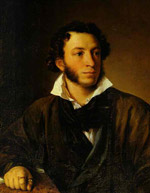
Founded in 1987 by the Duchess of Abercorn, the Pushkin Trust is a charitable organisation which works to provide and support a holistic model to spark imagination and deepen awareness of our collective creativity, our humanity and ‘the child’ within each one of us. The name of the Trust honours and invokes the spirit of Alexander Pushkin, one of Russian’s greatest writers and the Duchess of Abercorn’s direct ancestor. The organisation is commonly known as ‘Pushkin’. The principal target has always been the field of education and the method of delivery is through the creative arts and the natural environment with professional facilitation. For fifteen years a creative writing competition was the centre of the Pushkin Trust’s Schools’ Programme, in which fifty schools from both Northern Ireland and the Republic of Ireland participated each year. In 2002-2003 the creative writing competition evolved into a cross-curricular awards programme. This initiative still retains creative writing as the central core of activity and is supplemented in participating schools by other creative art forms. Exploration of the environment is used as an important source of inspiration.
 Pushkin was born in Moscow on May 26th 1799. He was educated at the Lycee of Tsarskoye Selo, near St. Petersburg. By the age of twenty he was already known as a major new poetic voice. A larger part of his adult life was spent in exile from St. Petersburg, first in the south of Russia and later on his country estate at Mikhailovskoye. Throughout this time he kept closely in touch with his literacy friends by correspondence, and his own creative work continued without a break, confirming his early success and fame. The autumn of 1830 marked a high point in his writing. At the end of the year he married the beautiful Natalia Goncharova; alas his marriage brought with it financial worries, as well as domestic responsibilities. Humiliated at court, disappointed in the declining public interest in poetry, he became increasingly agitated. Rumours about his wife’s honour led to a duel on January 27th 1837 in which he was mortally wounded. As a writer Pushkin was versatile and prolific. His reputation is based primarily on his achievement as a poet which extends over eight hundred lyric and a dozen narrative poems, ranging from the mock epic Ruslan and Ludmilla (1820) to The Bronze Horseman (1833), and intense story of the St. Petersburg floods of 1824 with political and philosophical overtones, perhaps his masterpiece. The novel in verse Eugene Onegin (1823-1831) is a kaleidoscopic work in which the simple plot is complimented by an irrepressible flow of pictures, images, ideas and comments on urban and rural Russia, on literature and human nature. Pushkin also made serious excursions into drama, with the Shakespearean tragedy Boris Godunov (1825) and four Little Tragedies (1830), a set of five anecdotes best read as parodies of cheap contemporary literature, The Queen of Spades (1833), an enthralling story of the supernatural told in an economic and down-to-earth manner, and the short historical novel of Catherine’s ear, The Captain’s Daughter. Pushkin’s greatest quality lies in his unsurpassed sense of language. Inheriting a Russian tongue newly modernised but limp from excessive Gallification, he showed, almost single-handedly, how this rich aristocratic form of disclosure could be invigorated by the vocabulary and rhythms of folk literature and speech of ordinary Russians. His acoustic sense, while never allowed to detract from meaning, has bequeathed a great legacy of perfectly tuned phrases, lines and entire passages remembered with affection by all Russian speakers. The overall spirit of Pushkin’s work, despite its excursions into tragedy, is positive, joyous and life affirming. Many ideas and themes originally sketched out by Pushkin were to be developed and fully worked out by large numbers of subsequent Russian writers. Musical settings and adaptations of his works are legion. Pushkin is remembered as the creator of modern Russian and the greatest single progenitor of Russian literature. A D P Briggs, M.A., Ph.D. Professor of Russian Language and Literature University of Birmingham
Pushkin was born in Moscow on May 26th 1799. He was educated at the Lycee of Tsarskoye Selo, near St. Petersburg. By the age of twenty he was already known as a major new poetic voice. A larger part of his adult life was spent in exile from St. Petersburg, first in the south of Russia and later on his country estate at Mikhailovskoye. Throughout this time he kept closely in touch with his literacy friends by correspondence, and his own creative work continued without a break, confirming his early success and fame. The autumn of 1830 marked a high point in his writing. At the end of the year he married the beautiful Natalia Goncharova; alas his marriage brought with it financial worries, as well as domestic responsibilities. Humiliated at court, disappointed in the declining public interest in poetry, he became increasingly agitated. Rumours about his wife’s honour led to a duel on January 27th 1837 in which he was mortally wounded. As a writer Pushkin was versatile and prolific. His reputation is based primarily on his achievement as a poet which extends over eight hundred lyric and a dozen narrative poems, ranging from the mock epic Ruslan and Ludmilla (1820) to The Bronze Horseman (1833), and intense story of the St. Petersburg floods of 1824 with political and philosophical overtones, perhaps his masterpiece. The novel in verse Eugene Onegin (1823-1831) is a kaleidoscopic work in which the simple plot is complimented by an irrepressible flow of pictures, images, ideas and comments on urban and rural Russia, on literature and human nature. Pushkin also made serious excursions into drama, with the Shakespearean tragedy Boris Godunov (1825) and four Little Tragedies (1830), a set of five anecdotes best read as parodies of cheap contemporary literature, The Queen of Spades (1833), an enthralling story of the supernatural told in an economic and down-to-earth manner, and the short historical novel of Catherine’s ear, The Captain’s Daughter. Pushkin’s greatest quality lies in his unsurpassed sense of language. Inheriting a Russian tongue newly modernised but limp from excessive Gallification, he showed, almost single-handedly, how this rich aristocratic form of disclosure could be invigorated by the vocabulary and rhythms of folk literature and speech of ordinary Russians. His acoustic sense, while never allowed to detract from meaning, has bequeathed a great legacy of perfectly tuned phrases, lines and entire passages remembered with affection by all Russian speakers. The overall spirit of Pushkin’s work, despite its excursions into tragedy, is positive, joyous and life affirming. Many ideas and themes originally sketched out by Pushkin were to be developed and fully worked out by large numbers of subsequent Russian writers. Musical settings and adaptations of his works are legion. Pushkin is remembered as the creator of modern Russian and the greatest single progenitor of Russian literature. A D P Briggs, M.A., Ph.D. Professor of Russian Language and Literature University of Birmingham
